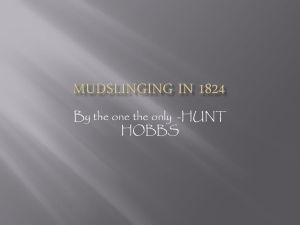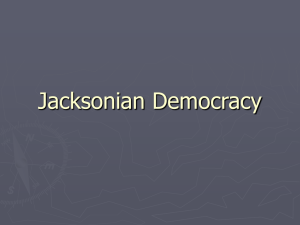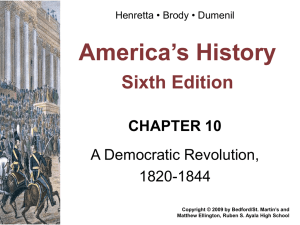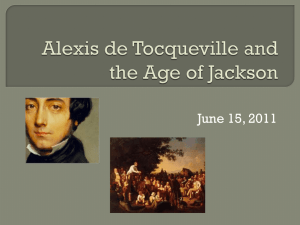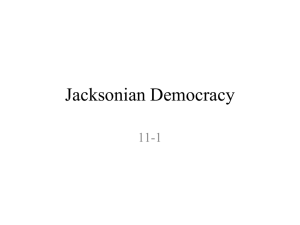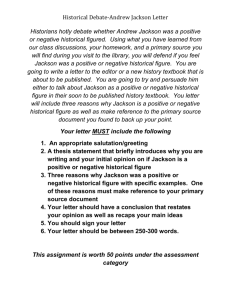The Rise of Popular Politics - Online
advertisement
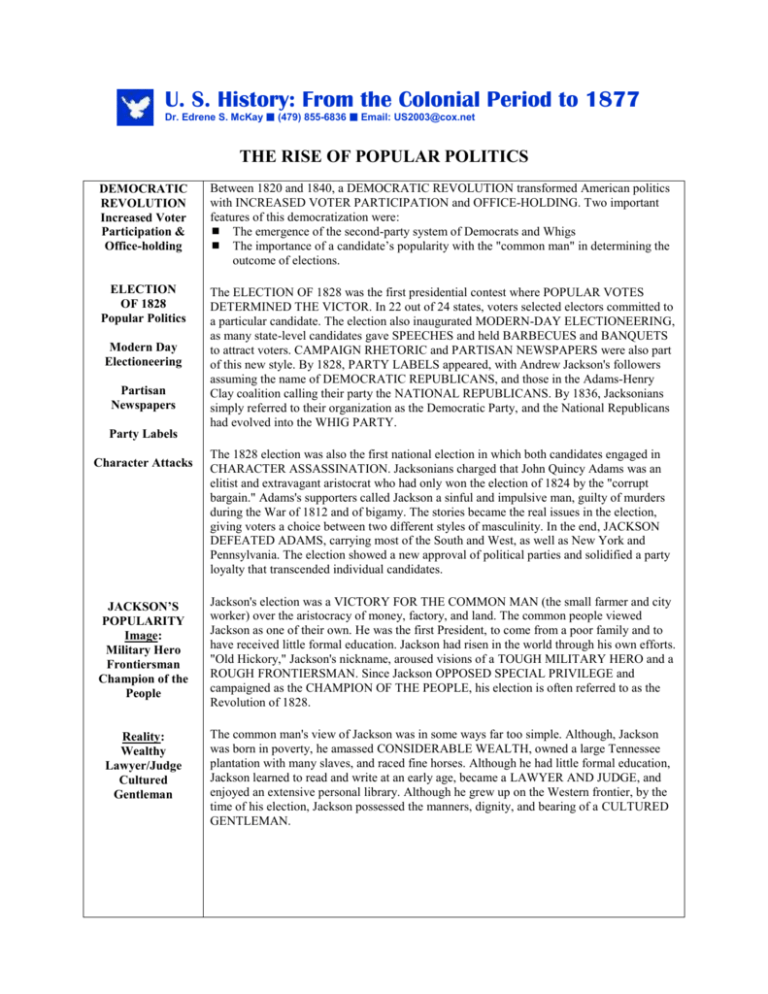
U. S. History: From the Colonial Period to 1877 Dr. Edrene S. McKay (479) 855-6836 Email: US2003@cox.net THE RISE OF POPULAR POLITICS DEMOCRATIC REVOLUTION Increased Voter Participation & Office-holding Between 1820 and 1840, a DEMOCRATIC REVOLUTION transformed American politics with INCREASED VOTER PARTICIPATION and OFFICE-HOLDING. Two important features of this democratization were: The emergence of the second-party system of Democrats and Whigs The importance of a candidate’s popularity with the "common man" in determining the outcome of elections. ELECTION OF 1828 Popular Politics The ELECTION OF 1828 was the first presidential contest where POPULAR VOTES DETERMINED THE VICTOR. In 22 out of 24 states, voters selected electors committed to a particular candidate. The election also inaugurated MODERN-DAY ELECTIONEERING, as many state-level candidates gave SPEECHES and held BARBECUES and BANQUETS to attract voters. CAMPAIGN RHETORIC and PARTISAN NEWSPAPERS were also part of this new style. By 1828, PARTY LABELS appeared, with Andrew Jackson's followers assuming the name of DEMOCRATIC REPUBLICANS, and those in the Adams-Henry Clay coalition calling their party the NATIONAL REPUBLICANS. By 1836, Jacksonians simply referred to their organization as the Democratic Party, and the National Republicans had evolved into the WHIG PARTY. Modern Day Electioneering Partisan Newspapers Party Labels Character Attacks The 1828 election was also the first national election in which both candidates engaged in CHARACTER ASSASSINATION. Jacksonians charged that John Quincy Adams was an elitist and extravagant aristocrat who had only won the election of 1824 by the "corrupt bargain." Adams's supporters called Jackson a sinful and impulsive man, guilty of murders during the War of 1812 and of bigamy. The stories became the real issues in the election, giving voters a choice between two different styles of masculinity. In the end, JACKSON DEFEATED ADAMS, carrying most of the South and West, as well as New York and Pennsylvania. The election showed a new approval of political parties and solidified a party loyalty that transcended individual candidates. JACKSON’S POPULARITY Image: Military Hero Frontiersman Champion of the People Jackson's election was a VICTORY FOR THE COMMON MAN (the small farmer and city worker) over the aristocracy of money, factory, and land. The common people viewed Jackson as one of their own. He was the first President, to come from a poor family and to have received little formal education. Jackson had risen in the world through his own efforts. "Old Hickory," Jackson's nickname, aroused visions of a TOUGH MILITARY HERO and a ROUGH FRONTIERSMAN. Since Jackson OPPOSED SPECIAL PRIVILEGE and campaigned as the CHAMPION OF THE PEOPLE, his election is often referred to as the Revolution of 1828. Reality: Wealthy Lawyer/Judge Cultured Gentleman The common man's view of Jackson was in some ways far too simple. Although, Jackson was born in poverty, he amassed CONSIDERABLE WEALTH, owned a large Tennessee plantation with many slaves, and raced fine horses. Although he had little formal education, Jackson learned to read and write at an early age, became a LAWYER AND JUDGE, and enjoyed an extensive personal library. Although he grew up on the Western frontier, by the time of his election, Jackson possessed the manners, dignity, and bearing of a CULTURED GENTLEMAN. The Rise of Popular Politics JEFERSONIAN V. JACKSONIAN DEMOCRACY POLITICAL ASPECTS OF JACKSONIAN ERA Democracy in the States Democracy in Presidential Elections Democratic View of the Presidency Page 2 JEFFERSON Believed that capable, well-educated leaders should govern in the people's interest. Represented an agricultural society. Limited democracy to its political aspects JACKSON Believed that people themselves should manage their governmental affairs. Represented a rising industrial society as well as an agricultural one Expanded democracy from its political aspects to include social economic aspects By 1828 most states had REMOVED PROPERTY AND RELIGIOUS QUALIFICATIONS for office holding and voting, INCREASED THE NUMBER OF ELECTED rather than appointed state and local offices, and given the people a greater check upon elected officials by SHORTENING THEIR TERMS OF OFFICE. Beginning with the election of 1832, instead of being named by a caucus of a few party leaders, the Presidential candidate of each party was named by a larger number of active party members at a NOMINATING CONVENTION. By 1832 the Presidential ELECTORS of all but one of the states were chosen directly by the voters instead of by state legislatures. Jackson held that the President, the only nationally chosen official, was the SERVANT OF THE PEOPLE, elected to further their interests and protect their rights. To achieve these purposes, Jackson used his powers vigorously: He employed the VETO more often than all the preceding Presidents together. He prepared to use force when South Carolina challenged the authority of the federal government (a story to be told later) He refused to enforce John Marshall's decision prohibiting Georgia from seizing CHEROKEE INDIAN LANDS. Jackson argued that the decision was contrary to the people's interest. Jackson's enemies referred to him as King Veto and King Andrew I. They called themselves Whigs, as had the 18th century opponents, of monarchical power in England. To the common man, however, Jackson remained both A VALIANT HERO AND A DEMOCRATIC SERVANT. Spoils System Rotation in Office ECONOMIC ASPECTS OF JACKSONIAN ERA Cheap Land Growth of Trade Unions Jackson was the first president, to employ the SPOILS SYSTEM widely. He filled some 20 percent of federal positions with "deserving" members of his own party, replacing the former officeholders. A Jacksonian supporter coined the phrase, "To the victor belong the spoils." ROTATION IN OFFICE, Jackson believed, was democratic because it prevented a permanent class of officeholders from becoming an aristocracy, and "the duties of public office are so plain and simple that men of intelligence may readily qualify themselves for their performance." (Civil Service reform comes with the Pendleton Act of 1883) Throughout the early years of the United States, Westerners demanded cheap land. In 1820 settlers had been permitted to purchase as little as 80 acres at $1.25 per acre. However, many settlers considered even this price too high. Many of them merely occupied public land as squatters. The preemptive laws, originating during the Jacksonian Era, gave SQUATTERS first right to buy the lands they had occupied and farmed. During the Jacksonian Era, the TRADE UNION MOVEMENT spread to several large cities, and a National Trades Union existed for a few years. Subsequently, in 1842, the courts for the first, time held trade unions and strikes legal. Workers also engaged in politics to further The Rise of Popular Politics Page 3 their economic interests. Nevertheless, the labor movement remained weak until well after the Civil War. CULTURAL ASPECTS OF JACKSONIAN ERA Separation Between Public & Private Division of Responsibility Education and Training of Youth Public Life, the Press, and Popular Amusements DISCUSSION QUESTIONS The growing SEPARATION BETWEEN PUBLIC AND PRIVATE LIFE, between the workplace and the home, caused increasingly SHARP DISTINCTIONS BETWEEN THE SOCIAL ROLES of men and women in Jacksonian America. In the middle-class family of the new industrial society, the husband was assumed to be the principal income producer, and the wife was expected to remain in the home and to engage in largely domestic activities. Within this context, women were to be the custodians of morality; they were to provide religious and moral instruction to their children, and to counterbalance the acquisitive, materialistic impulses of their husbands. The new market economy meant new opportunities for EDUCATING AND TRAINING THE YOUTH of the 1820s and 1830s. Northern states adopted PUBLIC SCHOOLING between 1790 and the 1820s, and the South soon followed. The job of educating the nation's youth began to fall more and more to women in their late teens, who provided an inexpensive source of teachers. Remarkably, BASIC EDUCATION WAS THE SAME FOR GIRLS AS FOR BOYS. HIGHER EDUCATION WAS A DIFFERENT STORY, with only Oberlin College accepting women in the 1830s, although a handful of top-notch seminaries offered college-level education to women who could afford it. While some male youths went on to college, the vast majority left school at fourteen to train for an occupation, often moving to the city to take entry-level business positions. Many youth were freed from family restrictions, a source of concern for moralists. RISING RATES OF LITERACY and new printing methods led to an EXPLOSION OF NEWSPAPERS. "Penny papers" covered a variety of issues ranging from entertainment to local news and exposés. By the end of the decade, PENNY PAPERS could be found in every metropolitan area of the nation as well as in smaller towns and villages. Beginning in the 1830s, TRAVELING LECTURERS crisscrossed the country, entertaining small-town audiences with a variety of presentations, ranging from dramatic readings of poetry and plays to lectures on history, physiology, and anatomy. THEATER also flourished in the 1830s, as audiences across the country applauded everything from Shakespeare to minstrel shows. Another popular diversion was PUBLIC ORATORY. Huge audiences listened with rapt attention to speeches at trials and to political orations that sometimes lasted for hours. What campaign strategies were used in the election of 1828? To what extent are the same campaign strategies used today? Give examples of how recent elections have mirrored the pattern established in 1828 of candidates projecting one image but in reality representing something quite different. Determine whether the political, economic, and cultural developments of the Jacksonian Era actually contributed to the well-being of the common people or simply helped candidates to win elections.


